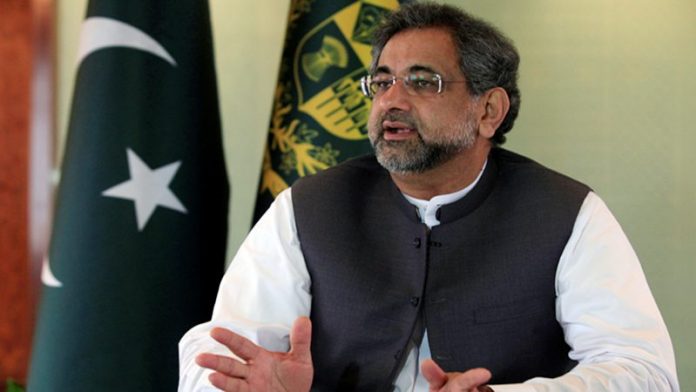DAVOS: Prime Minister Shahid Khaqan Abbasi Thursday said Pakistan with a huge market of 200 million people, an annual economic growth of around 6 percent and a strengthening democracy, was open to business and investment in diverse areas.
The prime minister expressed these views while addressing a press conference along with his ministers for foreign affairs, information and broadcasting, information technology, and national healthcare here in Davos, Switzerland.
He also mentioned the huge economic activity generated by the ongoing China Pakistan Economic Corridor (CPEC) project in the country under China’s One Belt One Road (OBOR) initiative.
The prime minister also mentioned the strengthening political situation in the country and said Pakistan was making history by completing a decade of democratic process.
To a question about growing Pak-China ties vis-a-vis the relations with the US, he said Pakistan had longstanding relations with both China and the United States, which the country considered very important and would continue.
“We are a country where warm winds are blowing from the East and the West,” he remarked.
He said the CPEC was not a Pakistan-specific project, as it would benefit the region and was open to other world countries as well.
To another question, the prime minister said Pakistan had highlighted Chinese President Xi Jinping’s vision of connectivity and linkages at every forum. This OBOR initiative would benefit the region and the world in the decades and millenniums to come, he added.
Prime Minister Abbasi appreciated the theme of this year’s World Economic Forum “Creating a Shared Future in a Fractured World” and said Pakistan was covering the theme in its economic endeavors.
He said during the interaction at various levels at the World Economic Forum in Davos, discussions were held on the issues of energy, technology, healthcare etc.
Foreign Minister Khawaja Muhammad Asif, to a question, hailed the Chinese vision of shared future, but mentioned that no efforts were being made by the world in terms of fractured world through resolution of issues like refugee crisis, Palestine, Kashmir and Rohangia Muslims. These are the case of fractured world, he remarked.
On the question of Pakistan’s relations with China and the United States, he said, the country enjoyed relations with both China and the US, with no cost for other.
He, however, added that Pakistan’s relations with the United States should not be through the prisms of a third country like Afghanistan.
Minister of State for Information, Broadcasting and National Heritage Marriyam Aurangzeb said 60 percent of the country’s youth were under the age of 35 and it was the government’s priority to engage them in inclusive development process.
As the youth were means of implementation for sustainable development goal, they were being engaged youth in reshaping the landscape and perception about Pakistan, she added.
The minister said Pakistan had been fighting the war on terrorism for the past 35 years and the country had achieved successes during the last four years in that war.
She said it was also a challenge for the youth who were confronted with perception about Pakistan across the world and now the government was using media for that matter and also regaining and reviving the indigenous narrative by engaging the youth into broadcast, media and film industry.
She said the government would announce its first film policy to engage the youth into the entertainment and broadcast industry by using them as a tool to change the image of Pakistan across the world.
Speaking on the occasion, Minister of State for Information Technology Ms Anusha Rehman Khan said the world had witnessed a phenomenal growth in Pakistan’s IT & telecom sector during the last three years because the government had accorded the highest priority to the development of ICTs.
She said technology was a tool to provide employment opportunities to the youth. “We are adding one million 3G and 4G customers every year and its big part is young population.”
Pakistan, she said, ranked fourth in freelancing and the government wanted to take it to number one position in that field. The minister said Pakistan’s software exports were $300 million in 2013, which now had reached $3.3billion in the last four years and the target by 2020 was $10billion.
She said Pakistan was a huge and attractive market for foreign investors, which was producing millions of IT professionals every year, besides a source of human resource development for the world.
Minister for National Health Services, Regulations and Coordination Saira Afzal Tarar, while speaking on the occasion, said the Prime Minister’s National Health Programme was covering millions of families. It was a pro-women programme where 70 percent of the women got benefitted from it, she added.
The minister said Pakistan had done a remarkable job by fighting the polio disease as evident from the fact currently there were only eight cases in the country. The major challenge in fighting polio, she said, was cross border rides but now the government had improved its permanent transit points. She said all Internally Displaced Persons (IDPs) had been vaccinated.
She said five chief executive officers of different sectors were interesting to invest in health sector in Pakistan.
Special Assistant to the PM Ali Jahangir Siddique said Pakistan was an emerging economy and was a great market for foreign world. Every telecom and mobile company was operating here as such openness of sharing the economy was rare, he added.
Siddique said agenda of the present government was to provide job opportunities. He said the young population was a blessing for Pakistan and the government had a simple approach to provide jobs to the youth.




